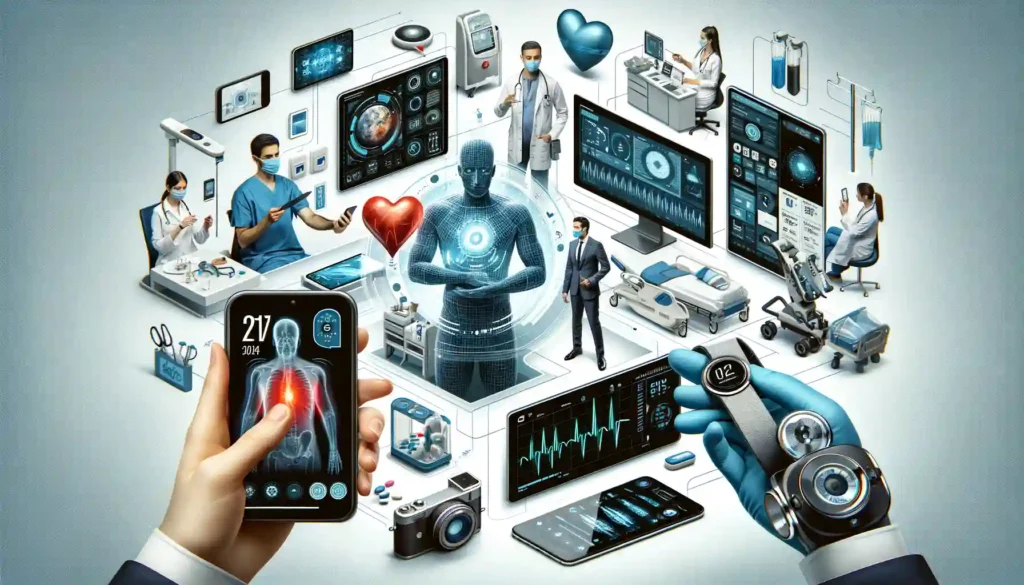In the ever-evolving world of healthcare, innovation and medical services are inextricably linked. But where is this dynamic field heading? Emerging trends like telemedicine, IoT devices, and virtual reality in surgical training are attracting massive investments, all with the goal of advancing global health equity.
Defining Digital Health Equity
According to the World Health Organization, health equity is defined as the absence of unfair and avoidable or remediable differences in health among population groups defined socially, economically, demographically, or geographically. With the scale-up of digital health solutions, we’re on the cusp of revolutionizing how people worldwide achieve higher standards of health and access essential services to enhance their well-being.
Driving Progress Toward Global Health Goals
Digital health presents a unique opportunity to accelerate our progress in achieving health and well-being, especially as outlined in Sustainable Development Goal (SDG) 3. It also plays a crucial role in reaching the World Health Organization’s ambitious triple billion targets for 2023, as stated in its Thirteenth General Program of Work (GPW13).
What is Digital Health?

Digital health is a broad field encompassing mobile health (mHealth), health information technology (IT), wearable devices, telehealth, telemedicine, and personalized medicine.
From mobile apps and decision-support software that guide doctors to artificial intelligence (AI) and machine learning (ML) tools, digital technology is revolutionizing healthcare. These innovations have the potential to improve diagnosis accuracy, enhance treatment, and optimize healthcare delivery.
The Power of Digital Health Technologies
Digital health technologies leverage computing platforms, networks, software, and sensors to improve healthcare and related activities. These tools span a wide range of uses, from general wellness to medical devices. They can be integrated into existing medical products, used as companion diagnostics, or serve as add-ons to other medical products, such as devices, drugs, and biologics. Additionally, they are instrumental in developing and studying new medical products.
The Impact of Digital Health Data

Data generated by medical technologies plays a crucial role in improving health outcomes and making healthcare systems more efficient. Here’s how digital health data can make a difference:
- Electronic Health Records (EHRs): Data can be stored and accessed electronically, shared between patients and healthcare providers, reducing the need for duplicate tests and improving care quality.
- Remote Monitoring & Telehealth: Enables care to be delivered at home, freeing up hospital resources and improving patient accessibility.
- Empowering Patients: Provides patients with the information they need to manage their conditions, reducing the need for doctor visits and enhancing mobility and quality of life.
- Comprehensive Care: When combined with data from other sources (e.g., social services, environmental information), it delivers holistic, integrated, patient-centered care, and supports public health, medical research, and scientific advancements.
Why is Digital Health Important?
The goals of the healthcare industry are diverse and complex: preventing disease, helping patients monitor and manage chronic conditions, reducing healthcare costs, and personalizing medicine to individual needs. What makes digital health so exciting is its potential to benefit both patients and healthcare providers. By collecting more data on health indicator such as activity levels and heart rate digital health aims to help people lead healthier lives and reduce the need for frequent doctor visits.
Digital health tools can also help identify new diseases or the worsening of existing ones, allowing doctors to intervene earlier. This could shorten the duration of illness or alleviate symptoms before they become severe. Not only could digital health improve quality of life, but it could also reduce the overall cost of healthcare over a person’s lifetime, benefiting both providers and patients.
The Benefits of Digital Health Technologies
Digital tools are giving healthcare providers a more comprehensive view of patient health through increased data access and empowering patients to take control of their health. These technologies offer real opportunities to improve clinical outcomes and enhance efficiency. Here’s how:
- Reducing Inefficiencies: Streamlining processes to save time and resources.
- Improving Access: Making healthcare more accessible, particularly in remote areas.
- Cutting Costs: Lowering the cost of healthcare delivery and management.
- Enhancing Quality: Elevating the standard of care provided to patients.
- Personalizing Medicine: Tailoring treatments to meet individual patient needs.
Patients and consumers can use digital health technologies to better manage and track their health and wellness activities. The use of smartphones, social networks, and web applications is not only transforming the way we communicate but also providing innovative ways to monitor our health and well-being, granting us greater access to information. Together, these advancements are driving the convergence of people, information, technology, and connectivity to improve healthcare outcomes.
Challenges in Digital Health Design, Validation, Testing, and Deployment
- Industry vs. Market: The companies providing digital health products and services make up the industry, while the customers using these products to meet specific needs represent the market.
- Investment Risks: Digital health investors seek the highest return with the least risk. The uncertain legal, regulatory, and reimbursement landscape makes it difficult to predict which tools will be supported by the industry and users.
- Clinical Validation: Most digital health technologies have not been clinically validated. Clinical trials may be necessary to validate these tools before stakeholders can determine the best technology.
- Regulatory Guidance: The FDA continues to issue periodic guidance documents and regulations, contributing to uncertainty in the market.
- Stakeholder Alignment: With diverse stakeholders in healthcare—such as payers, providers, patients, business partners, and more—it’s challenging to prioritize any single user. Multiple stakeholders need to see the value of a given product or service.
- Market Adoption: The digital health industry is still young, and there’s not enough research to understand which customers, patients, or stakeholders will adopt a product and why.
- Scaling Up: Companies that have secured substantial investments have rapidly scaled their customer base by at least 70% per year.
- Physician Adoption: Doctors may lack the information needed to prescribe or use a specific digital health technology. Additionally, most doctors are not compensated for using digital health tools, which disrupts their workflow and presents behavioral and emotional barriers to adoption by both patients and their families.
- Data Privacy and Security: Significant concerns around confidentiality, security, and data privacy remain unresolved.
What Problems Are Digital Health Companies Solving?
As applications and peripherals began accumulating vast amounts of data, companies quickly saw the potential to extract value from it. Here’s why tech companies are zeroing in on health: it’s a massive, recession-proof industry that’s also costly. As demand grows, providers are seeking new ways to save costs—one approach is to shift the focus from treating diseases to preventing them.
Many conditions with increasing prevalence—such as type II diabetes, hypertension, and high cholesterol can largely be prevented or managed through lifestyle changes like maintaining a healthy diet and active lifestyle. This is where digital health wearables come in: by helping people track their weight, exercise, and more, these devices could empower individuals to take better control of their health.
Read More
- What Is Digital Trust Technology
- The Importance of Telehealth in Modern Life
- What Is a Digital Immune System?

